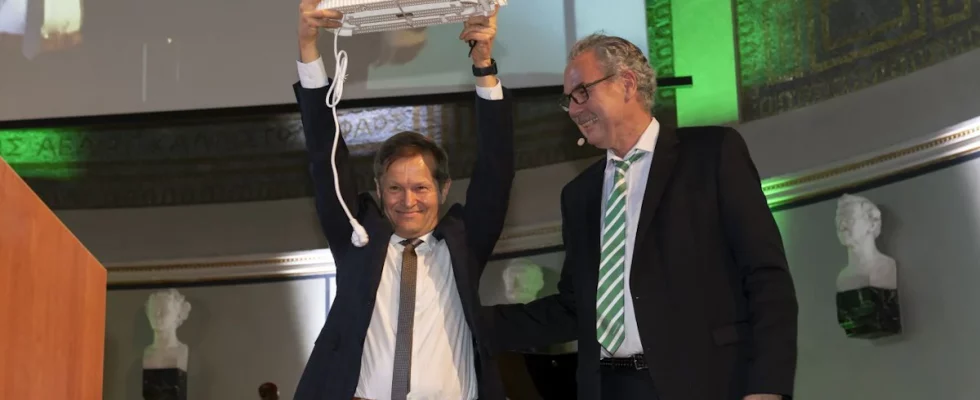Normally it is flowers that are presented to a speaker for his words. In this case, even a Nobel Prize winner talks, ready for print, about infrared fingerprints of blood plasma and electrons whizzing around. But Ferenc Krausz, who received the 2023 prize for physics, doesn’t get any flowers. But a white, elegantly designed toaster with a ribbed look. He’s really happy about it. He had been “dreaming” about such a device for years. Really now?
A speech later in the large auditorium of the Ludwig Maximilian University, Karl-Walter Jauch also holds a toaster in his hands. The former medical director of the LMU Clinic was just awarded the Heinz Goerke Medal at the annual reception “50 Years of Großhadern” for his special commitment to this clinic. The new kitchen utensil? “Wonderful,” he says happily. And Minister of State Markus Blume revealed in his speech: He too had hopes for something like this.
Why a toaster? When the Großhadern Clinic, one of the largest university hospitals in Germany and Europe, was built between 1967 and 1977, buildings made of exposed concrete were in vogue. One building in particular embodies this architectural style: the ward block. At 205 meters long and 63 meters high, it looks – from a distance and from a bird’s eye view – like an oversized, but not particularly pretty, toaster. A nickname is born.
11,412 employees from 115 countries currently work in the world’s largest toaster and the many other LMU clinic buildings. 56,861 operations and 247 organ transplants were carried out last year. There were 73,976 patients in the ward. In 50 years, a large campus has been created that continues to grow. The new, most modern children’s clinic in Europe will be built there in the next few years. The Großhadern Clinic stands for innovative developments in medicine, for milestones in oncology and transplantation medicine. All speakers of the evening see it that way.
Everything about this evening, which the medical director of the LMU clinics, Markus Lerch, moderated with a lot of humor and lightness, is somehow connected with major issues. The speakers, the guests of honor, even the band are made up of hospital loyalists. It’s almost surprising that doctors and students didn’t chop up vegetables for the appetizers and finger food jars.
But above all, and that’s the best part, the evening tells many stories. From Otto Schmidt, for example. He was construction manager for the new building from 1969 to 1983 and recorded the clinic’s long construction history in 250 black and white sketches; they are projected onto the large screen in the auditorium. Bernd Ullrich is also there. The 84-year-old received his new heart in Großhadern 41 years ago and is the longest surviving heart transplant patient in the world.

Suddenly the party guests are also sitting in the cinema. An excerpt from the 1991 film “Rama dama” by Joseph Vilsmaier (1939-2020) is shown. A child is born there. It is the director’s second child who makes his first film appearance there. “Vilsmaier really wanted his wife and leading actress Dana Vávrová to have their child in front of the camera,” remembers Ernst-Rainer Weissenbacher. The gynecologist and former head of the LMU gynecology and obstetrics polyclinic has given birth to countless children. He is friends with the director and makes it possible: Theresa Vilsmaier was born on June 8, 1989. In Großhadern. “A touching moment,” says Weissenbacher, who can also be seen for a brief moment in the film.
Then Theresa Vilsmaier herself appears on stage. The now 35-year-old is now a doctor at the Großhadern Fertility Center. She actually wanted to study law in London, but then her mother became seriously ill with cancer and she immediately returned to Germany. Dana Vávrová died in 2009. “One reason why I studied medicine,” says her daughter. And at the end he gives the next speech together with Weissenbacher. Großhadern is one of the places where two things are combined: outstanding excellence and humanity. “This empathy,” says Weissenbacher, “needs to be preserved.”

